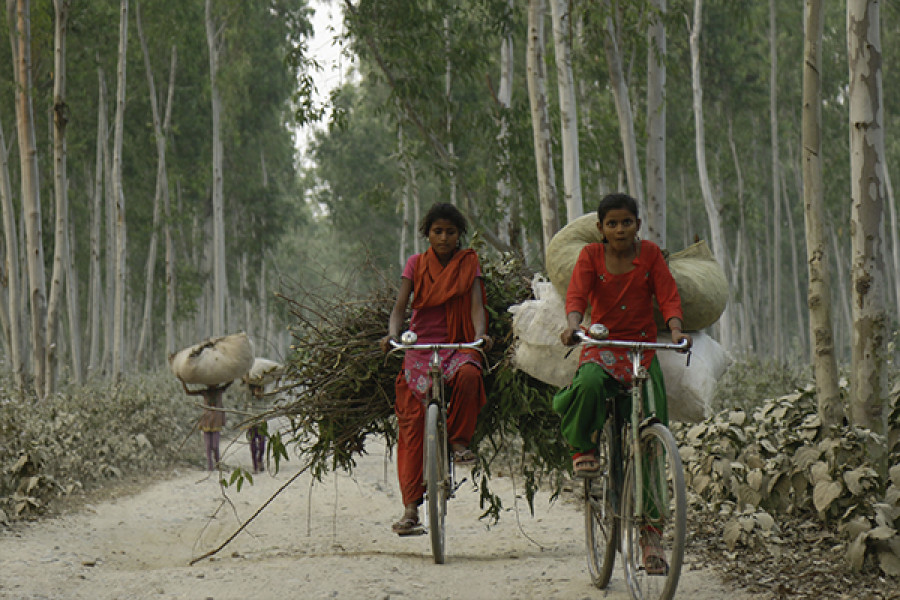Climate & Environment
Heavy taxes on community forests irk community forest users
Locals involved in forest conservation say communities will stop looking after forests if all three levels of government impose taxes on them
Chandan Kumar Mandal
The northern side of East-West Highway in Gaindakot, Nawalparasi, used to be an open barren land a little over two decades ago. What little vegetation that grew in the area would burn down every summer due to bushfires.
Twenty-four years ago, the residents of Gaindakot decided to do something about this. They formed Sundari Community Forest Users’ Group and began planting trees in the area.
Their efforts paid off eventually. The once arid landscape gradually came to life. Over the years, saplings became trees while grass and shrubbery also thrived. All the while the Gaindakot residents made a point of allowing the young forest to grow in the most natural way possible.
“Even when the locals needed firewood for consumption, we did not turn to the forest. We bought firewood from elsewhere,” Thakur Prasad Pandey, chairperson of Sundari Community Forest, told the Post over the phone.
Today, Sundari Community Forest is spread across four wards of Gaindakot Municipality. Nearly 2,800 families are actively associated with the forest group.
Besides conserving the forest and improving the green cover in the area, the group also works for the welfare of the local community. As part of the group’s obligation of contributing towards poverty eradication, it has constructed 28 houses for poor families.
With its annual income, the community forest user group has also been gravelling roads, building schools, supporting in remuneration of school teachers and installing deep boring systems to address the water needs of the people.
According to the existing Community Forestry Guidelines, 2014, community forest users’ groups have to spend their earnings accumulated from forest products on forest development (25 percent ), poverty eradication and livelihood (35 percent) and remaining on social development (40 percent) programmes.
The contributions of locally managed forests across the country are remarkable.
But concerns are growing of late that the community forests may not be able to sustain themselves, let alone help in local development, due to three levels of taxes, proposed and enforced after the country adopted federalism.
“We have given two decades of our sweat and blood to bring the forest to the present condition. We made sure our forest is saved at any cost,” said Pandey. “Community forest is not a profit-making entity. It conserves the forest and utilises the same money for local development. But now taxes have been imposed on us like we are a profit-making company.”
Various enforced and proposed taxes at all three levels of the governments have totaled up to 90 percent of community forests’ annual transactions.
As per the Finance Act, community forest users’ groups have to contribute 15 percent on the sale of timber of Shorea robusta (Saal) and Acacia catechu (Khayar) species to the Federal Reserved Fund. An additional Value Added Tax of 13 percent is added on the sale of timber products for commercial purposes. Community forest users’ groups must also take Personal Account Number and the amount in their account is counted as their annual income, hence they are liable to 25 percent [income] tax.
The Intergovernmental Fiscal Arrangement Act, 2017 has proposed that 15 percent tax collected from the sale of timber of Shorea robusta (Saal) and Acacia catechu (Khayar) should be distributed among local, provincial and federal governments.
Likewise, the Local Government Operation Act, 2017 has stated that community forests will have to contribute 10 percent from their product sales to the Reserved Fund at the local level.
Federation of Community Forestry Users’ Nepal, the umbrella organisation of 22,226 forest users’ groups, are displeased with the government’s intention of imposing heavy taxes on forest conservation groups, which have contributed in recovering country’s green coverage and alleviating poverty.
According to the federation, such taxations will discourage local communities from taking the lead in conservation and community welfare in the future.
“The government’s attitude towards community forest users has hurt tens of thousands of families who have been conserving forests in their areas for decades. We had just started making incomes and were thinking about doing something good to improve our communities,” Kamal Bindu Khanal, chairperson of Madhyabindu Laligurans Community Forest in Nawalparasi, told the Post over the phone. “Now, heavy taxes have dashed our hopes.”
Established nearly 10 years ago, Madhyabindu Laligurans Community Forest Users’ Group succeeded in turning a barren hill into a full-grown forest spread across 146 hectares. But not only that, the group, which is made up of 220 families, also succeeded in controlling the recurrent problems of soil erosion and flooding in their settlements. This was all possible because of their hard work and resourcefulness.
In the local community, it has been supporting animal husbandry, improving grazing areas, building roads and embankments, and providing scholarships to needy students.
“If we pay these taxes to all three levels of government, then there won’t be any money for forest conservation,” said Khanal. “The forest will bear the brunt. People’s enthusiasm will die. I can challenge the government that these all forest will be razed down in a single day if communities do not protect them. Neither the Army nor other security forces can save these forests without community support.”
Forest Bill of Province 3 has proposed a 25 percent tax on the sale of timber products and firewood and an addition 2 percent service charge on these products consumed among the community forest associated families.
While only Province 3 has proposed the total 27 percent taxes on forest products so far, stakeholders fear other provinces may also follow suit and introduce heavy taxes on locally managed forests.
Community forest promoters have demanded that the government revoke all the imposed and proposed taxes at once.
“Community forest users’ groups are voluntarily protecting forests for all these years. Now, the government is imposing taxes on all the incomes of community forests, which is a service-oriented sector,” said Bharati Kumari Pathak, chairperson of the federation.
Community forest users’ groups have also criticised the government for eyeing the income of local communities while it already has controlled revenues coming from all the protected parks of the country.
“As citizens we are ready to pay taxes. But we cannot pay taxes to all layers of the government,” said Khanal. “If the government doesn’t listen to us and moves ahead with imposing these taxes, we will be compelled to take to the streets.”




 11.12°C Kathmandu
11.12°C Kathmandu











